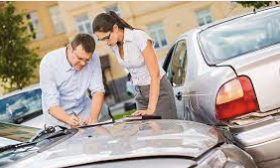One of the biggest mistakes you can make after being in a car accident is leaving the scene without gathering crucial evidence. Ensure you stay at the scene, check yourself and other passengers for injuries (while it’s safe), and collect your name, driver’s license, and insurance details from other drivers involved in the accident.
Admitting Fault
Fault determinations are a critical part of the claims process. However, it’s best to avoid admitting fault at the scene of a car accident, especially in front of police officers or insurance company representatives who may pressure you. Even the smallest admissions at the scene can be used against you in legal proceedings.
Admitting fault at the scene can speed up the insurance claims process, lead to a more fair settlement, and allow the insurance company to represent you. Plus, showing integrity and accountability is the right thing to do. In addition, it can also help you avoid being held responsible for any damages incurred if the accident occurred in a contributory negligence jurisdiction. However, if you have doubts about your responsibility, consult a car accident Irving attorney before making any statements.
Admitting Liability
A car accident can be a scary and confusing experience. In the heat of the moment, it’s common for drivers to admit fault at the accident scene. However, it’s important to remember that your statements could be used against you in court, especially if another driver claims you’re at fault for the crash. It’s best to avoid admitting liability at the crash scene and let investigators and your attorney determine who is responsible for the accident.
Documenting the scene of the accident is also essential. It is crucial to take pictures of all the vehicles involved and any damage and skid marks to prove liability and support your insurance claim.
If possible, collect contact information from witnesses as well. This can help keep your case if there are discrepancies in the accounts of the collision between you and other parties.
Not Taking Pictures
The moment after a car accident can be scary and confusing. If it is safe, you should take as many pictures of the accident scene as possible.
If you are too injured, shaky, dizzy, nauseous, or frightened to take photos safely, ask someone else to do it for you. You should also write down any information about the other driver, such as their name and license number.
Documentation of the car accident is important for both insurance purposes and legal proceedings. Prioritize capturing images of vehicle damage and damage to nearby signs, buildings, or the roadway. Also, be sure to photograph the area from different angles and distances. If you can, use a reference item for scale.
Delaying Contacting Your Insurance Company
While politeness is widely embraced, being overly courteous after an accident can cost you. For instance, if you apologize to the other driver or even hint that you might have been at fault for the crash, this can be misinterpreted as an admission of guilt.
When speaking to insurance representatives, remain calm and only provide the information they request. Taking the time to document everything at the scene can also be valuable. For example, take pictures of both vehicles’ positions and damages from several angles. Also, note skid marks and damage to street signs and other road-related items.
In addition, it is important to follow up on medical appointments. While some injuries are obvious, others may only become evident later on, and failing to attend to them could harm your claim.
Not Getting Medical Attention
Even if you aren’t seriously injured in the accident, seeing a doctor as soon as possible is still important. The doctor will give you a thorough physical and may run tests to ensure no hidden injuries. These injuries, such as whiplash or internal bleeding, often don’t show symptoms until a day or two after the accident, and seeing a doctor early on can help prevent them from becoming worse.
Also, a visit to the doctor provides documented evidence of your injuries and the accident. This could be crucial if you file a personal injury claim in the future. Insurance companies will use your delay in seeking medical attention against you. So, avoid this mistake at all costs.




